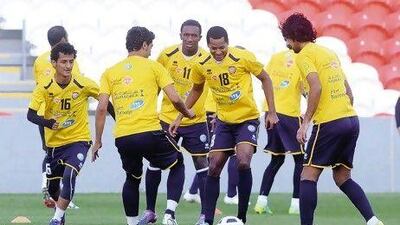The expression "golden generation" comes too easily to the lips of fans, journalists and football executives. A regional age-group trophy, a couple of kids signing with a big club … and here come the glittering allusions.
The Hungary of Puskas, the Holland of Cruyff, the France of Zidane - those were generations golden. They did not always win major championships but they always seemed on the verge of them.
And perhaps most significantly, they stood out among their compatriots - both before they arrived and after they were gone.
By that standard, the cohort of Emirati footballers born from 1989 until 1991 are not far from earning the "golden" appellation so often gifted them. One could make a case that they can win their way to that title by qualifying for the London 2012 Olympics over the next 22 days.
They already have batches of laurels. They announced themselves in 2008 by winning the Under 19 Asian Cup. In 2009, it was a run to the quarter-finals of the U20 World Cup. In 2010, they won the U23 Gulf Cup championship and a silver medal at the Asian Games.
Those are impressive age-group achievements even for a Spain or a Brazil. That they have been recorded by a nation of barely one million citizens makes them jump off the page.
And now they are on the cusp of a berth in the Summer Olympics, which is effectively the U23 World Cup.
Victories tonight over Australia and in Uzbekistan on March 14 would send the UAE to London 2012, and that would signify the greatest accomplishment by an Emirati football team since 1990, when the UAE qualified for the World Cup. (Just as the current U23s were being born, interestingly.)
A hallmark of an elite group is how they tick all the boxes on the pitch, and this UAE team does that. A prolific striker? Hello, Ahmed Khalil. A gifted playmaker? Take a bow, Amer Abdulrahman. A dominant defender? Come on down, Hamdan Al Kamali.
By no means are they the only stalwarts in Mahdi Ali's side. Two of them, Khalil and Al Kamali, were not in the team for the gritty 1-0 UAE victory over Iraq in Doha 17 days ago.
Aurelio Vidmar, the coach of the Australian side who play the UAE tonight, took note. "They have a lot of depth," he said of the UAE. "In this last game against Iraq, they had five different players from when we played them."
Even more remarkable? Car accidents removed two of the most important figures from the 2008 side who won a continental championship in Dammam. Yousuf Abdulrahman, the goalkeeper, was nearly killed in 2010 and has yet to return to the game. Theyab Awana, the gifted winger, died in 2011. And still this group pushes forward.
Just as constant as the core of players has been the man leading them. Ali certainly ranks among the greatest coaches produced by the country, and the Football Association showed great wisdom in recognising the talent at his disposal in 2008 (as well as what he did with it), and choosing to keep together that coach and these players.
In the optimistic corners of UAE football, where the failures of the senior national team do not daunt, the hope is that this possibly golden group might yet return the country to the World Cup before they are done, and perhaps Ali will lead them there.
They have pressing assignments tonight and three weeks hence: the date with Australia, one of the three superpowers of Asian football, followed by the journey to Uzbekistan, a rising continental power. Not an easy double-header.
Yet if this UAE team do what they so often have, look for them in London, come July, polishing golden reputations fairly won.

